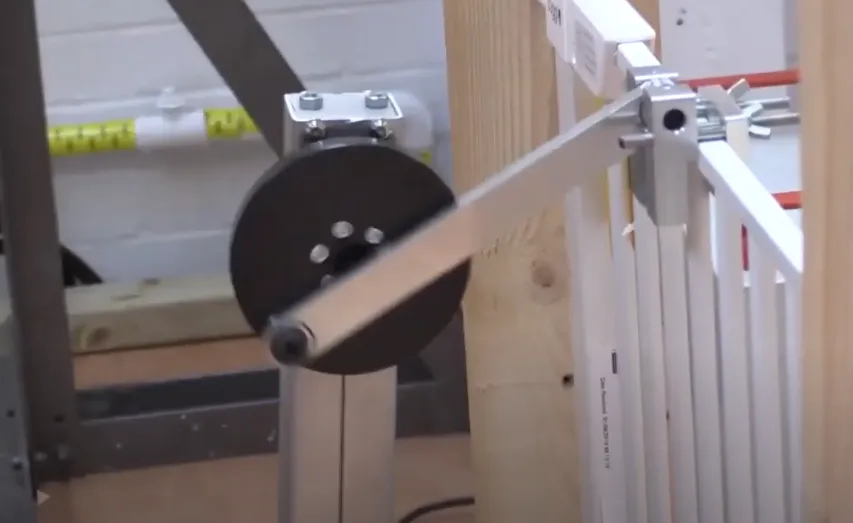ASTM F2613 Safety Testing of Children’s Folding Chairs
The ASTM F2613 standard is a crucial benchmark for ensuring the safety and durability of children's folding chairs. This testing protocol aims to protect young users by identifying potential hazards that could lead to injury or discomfort during use.
ASTM F2613 specifies a series of tests designed to evaluate various aspects of folding chair design, including structural integrity under load, stability, and the presence of sharp edges or protrusions. Compliance with this standard is mandatory for manufacturers looking to ensure their products meet consumer safety regulations in markets like the United States.
The testing process involves several critical steps that must be meticulously followed to achieve reliable results. Specimens are subjected to static loading tests to assess how they perform under sustained weight, dynamic impact tests to simulate real-world use scenarios involving children jumping or falling onto the chair, and edge sharpness evaluations to ensure no parts pose a risk of cuts.
Manufacturers must also consider the materials used in constructing these chairs. The choice of material can significantly influence the outcome of ASTM F2613 testing. For instance, wood should be treated properly to prevent splintering, while metal components need careful inspection for any signs of corrosion or weak welds that could compromise safety.
Quality managers and compliance officers play a pivotal role in overseeing these tests. They ensure all steps are followed correctly and that records of testing results are maintained accurately. This documentation is essential not only for meeting regulatory requirements but also for providing transparency to customers about the product's safety features.
R&D engineers involved in developing children’s furniture must stay abreast of updates regarding ASTM F2613 standards. By doing so, they can incorporate necessary improvements into their designs early on, reducing time-to-market and associated costs while enhancing product safety.
For procurement teams working with suppliers, understanding the implications of these tests helps in selecting reliable partners who adhere to high-quality manufacturing practices. Suppliers familiar with ASTM F2613 will be better equipped to deliver products that pass rigorous scrutiny without compromising on cost or functionality.
| Test Type | Description | Purpose |
|---|---|---|
| Static Load Test | Measures how a chair holds up under continuous weight. | Evaluates structural integrity and durability. |
| Dynamic Impact Test | Simulates impacts that may occur during typical use. | Assesses stability and resistance to movement or collapse. |
| Edge Sharpness Evaluation | Evaluates the smoothness of edges and surfaces. | Prevents injuries from sharp protrusions or splinters. |
The importance of ASTM F2613 cannot be overstated, especially given the diverse range of furniture types available for children. From high chairs to play tables and beyond, ensuring all components meet this standard contributes significantly towards safeguarding child health and well-being.
Eurolab Advantages
At Eurolab, we pride ourselves on offering comprehensive testing services tailored specifically for your unique needs. Our team of experienced professionals ensures that every aspect of ASTM F2613 compliance is met with precision and thoroughness.
We provide state-of-the-art facilities equipped with the latest technology to conduct all necessary tests accurately and efficiently. Our highly skilled technicians follow strict protocols throughout each step, ensuring consistent quality across multiple projects simultaneously.
The benefits extend far beyond just passing inspections; our expertise helps you identify potential issues early on in the production cycle, allowing for timely adjustments that enhance overall product performance. Additionally, by leveraging our network of international partners, we ensure your products comply with global standards wherever they are destined to go.
Our commitment to excellence is reflected in our unwavering dedication to staying up-to-date with all relevant regulations and industry trends. This ensures that when you partner with Eurolab, you receive the most accurate and reliable testing services available today.
Quality and Reliability Assurance
Maintaining top-notch quality standards is at the core of what Eurolab stands for. We employ rigorous quality control measures throughout every phase of our service delivery, from initial consultation through final report generation.
A key component of this process involves meticulous specimen preparation. Before any testing can commence, samples are carefully selected based on their representativeness of the production batch and potential variability within it. This ensures that test results accurately reflect real-world conditions rather than anomalies caused by sampling errors.
During tests themselves, our technicians adhere strictly to prescribed procedures outlined in ASTM F2613. Any deviations from these guidelines are documented immediately so corrective actions can be taken promptly. Post-test analysis includes thorough review of all collected data against established criteria to confirm compliance with specified limits.
In addition to technical accuracy, Eurolab places great emphasis on communication and transparency throughout the entire process. Regular updates keep clients informed about progress, while detailed reports provide comprehensive insights into test outcomes. This level of collaboration fosters trust between us and our partners, ensuring satisfaction from start to finish.





